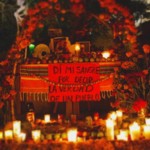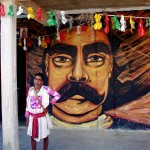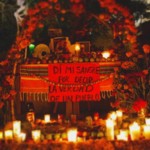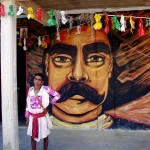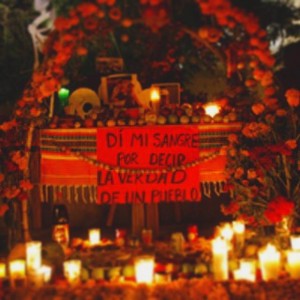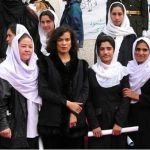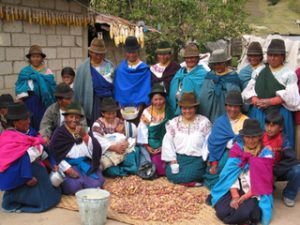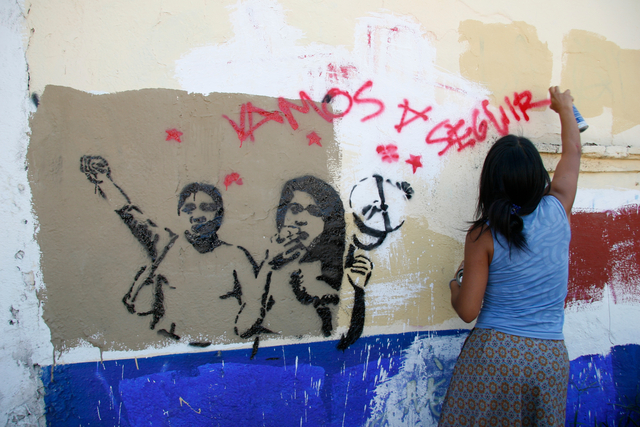By Karin Orr
On October 30th, 2006, amidst the smoke, scorched cars, police barricades, and remnants of various rubbish formerly used as blockades by La Asamblea Popular de los Pueblos de Oaxaca (APPO), six participants arrived from various parts of the United States to Oaxaca city for Global Exchange’s nine-day Dia de los Muertos Reality Tour.
Anxious to begin our strategic itinerary to explore Oaxaca’s rich culture through excursions of notorious archeological ruins, mezcal palenques, artisan workshops, and festivities of Mexico’s Dia de los Muertos, delegates, including myself, were confronted by the limitations of our possibilities. These limitations were due to the political reality of the police invasion on the teacher’s movement by troops of the Policía Federal Preventiva (Federal Preventative Police) that occurred October 29th. Formerly spearheaded by the Mexican National Educational Workers Union, APPO was formed on June 14, 2006 as a response to violent police intervention to dislodge the peaceful teachers strike, for higher pay and improved education, of 23 days.
Having just barely missed October 29ths expulsion of APPO demonstrators from Oaxaca’s main square, El Zócalo, (carried out by approximately 4000 federal police ordered by Vicente Fox) as well as the assassination of four demonstrators, including Indymedia journalist Bradley Will, we couldn’t have arrived at a more pivotal moment for the movement. Needless to say, it was an experience our Lonely Planets did not prepare us for. Armed and masked Federal Police occupied the entrances to the downtowns main streets, twenty-four hours a day, using shields as blockades with tanks and helicopters less than a mile away.
Nonetheless, we were determined to see and experience what we came for, even if that meant our travel itinerary would be altered because of police occupation. Our well-informed Global Exchange delegation leader, Juan de Dios Gómez Ramírez, supported our decision to continue with the delegation despite Global Exchange’s warnings and so we progressed for the following five days that circumstances allowed us.
Our days, though numbered, were an enriching experience; especially for those of us who are used to the comforts of living in a country where political demonstrations are limited by permits.
These excursions included witnessing the making of Mexico’s strong distilled spirit, Mezcal, from agave plant to finished product, presented by a family owned distillery whose market is threatened by the rapid growth of industrialized production. We also visited Teotitlan del Valle (about 28 kilometers from Oaxaca city) home of Zapotec weaving artisan, Jose Buenaventura Gutierrez, who demonstrated the use of natural resources to dye the yarn used to weave his beautifully crafted carpets.
Even while on the outskirts of Oaxaca city, features of the movement, such as the sounds of helicopters above and graffiti demanding the resignation of Oaxaca’s Governor Ulises Ruiz Ortiz, were evident. Graffiti slogans read; ” Fuera U.R.O.!”, “Muera el P.R.I.!” and “Muera el mal Gobierno!” (Get Out Ulises! Death to the P.R.I.! Death to the Bad Government!)
The night of Dia de los Muertos we visited several candlelit cemeteries in Xoxocotlán where family and friends mourned the loss of their loved ones and celebrated the resurrection of their spirits through song, live music, dance, chanting, prayer and beautifully decorated altars.
Due to the reported sixteen recent deaths of APPO demonstrators and the overwhelming police occupation, the ethos of the evening was particularly spiritual and mesmerizing. The streets were filled with food vendors, live bands, and sand paintings of saints as well as art displays and altars commemorating the dead—including those who lost their lives to the movement. (We were later informed that compared to prior years this year’s festivities were sparsely populated.)
Our final day in Oaxaca coincided with the PFP siege of Oaxaca University, where APPO members transmitted the radio station pertinent to the mobilization of the movement. From the hills of the Zaachila archeological zone, we witnessed the smoke rising from the University as well as police helicopters that were being used to deposit tear gas onto protestors. In the town square of Zaachila we heard the clanging of church bells and amplified voices of locals encouraging community members to go to the University to support their comrades from the PFP siege.
Following our excursion we returned hear the testimonies of two indigenous women who were members of the Committee of the Wives of Prisoners in Loxicha, (CWPL). They spoke on behalf of their husbands who had been imprisoned and tortured as alleged members of the guerilla group, EPR, Ejército Popular Revolucionario. In 1996, the EPR had their first attack resulting in the mass subjected arrests of 150 indigenous peasants from Loxicha. These women were the wives of detainees and had camped in the Palacio de Gobierno de Loxicha, under nothing more than tarps, for four years demanding the release of their falsely accused husbands.
Their testimonies clarified alternative motivations behind the mass arrests, as a probable alliance between the government and powerful landowners, who had a history of disputes over the ownership of lands claimed by local communities. It’s no wonder why the majority of detainees are members of largely indigenous local city authorities. Their testimonies conveyed the repression of the Mexican government, the difficulty of supporting a family as single mothers, as well as their determination and successful ability to organize in response to government repression and injustice; resulting in the formation of CWPL.
Shortly thereafter, after police questioned our trip leader, and rumors of violent escalations were circulating, our delegation came to an end.
Several days after our departure, a march containing thousands of APPO supporters took place; police built barricades fenced by six feet of barbed wire blocking entrance to the Zócalo.
Despite the cancellation of the remaining week, we authentically experienced the fundamental meaning, importance, and reality of community organizing by being present during these crucial moments in the community of Oaxaca, in addition to observing the strength of non-violent protestors in response to State violence. We witnessed the occupation of a city, not only by PFP, but firstly by the ideas and determination of the people who were fighting, losing their lives, and integrating their cultural celebration for a cause that extends beyond the barbed wire barricades of Oaxaca City.
Please check our website for further information about Reality Tours and for ways to support the teachers movement in Oaxaca. To tune into APPO radio stream via cell phone call: (+US) 213-825-2000.
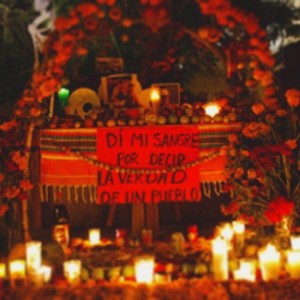 Our trip with Global Exchange to Oaxaca, Mexico was more than a typical educational opportunity. The participants were able to actively participate in many authentic aspects of everyday Oaxacan life associated with the preparation for the Days of the Dead. In addition, the group experienced social processes and was able to participate in meetings and workshops about sustainability, indigenous people’s human rights and the historical importance of corn in the Valley of Oaxaca.
Our trip with Global Exchange to Oaxaca, Mexico was more than a typical educational opportunity. The participants were able to actively participate in many authentic aspects of everyday Oaxacan life associated with the preparation for the Days of the Dead. In addition, the group experienced social processes and was able to participate in meetings and workshops about sustainability, indigenous people’s human rights and the historical importance of corn in the Valley of Oaxaca.
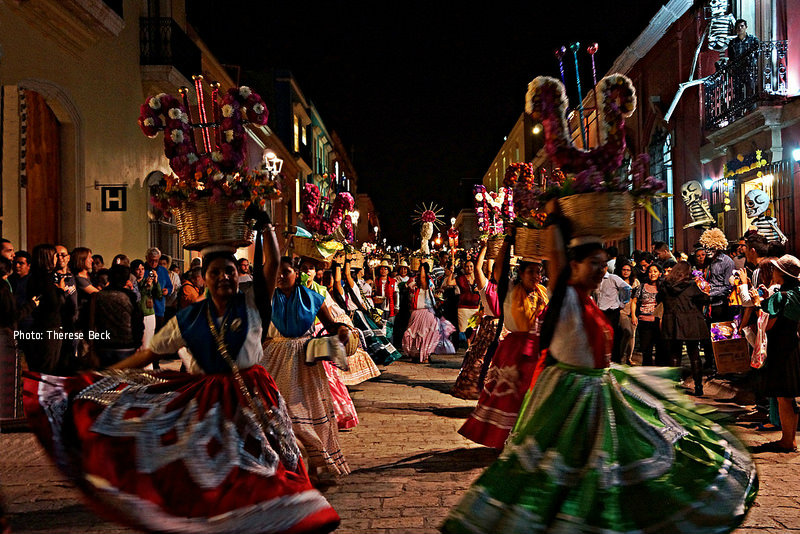
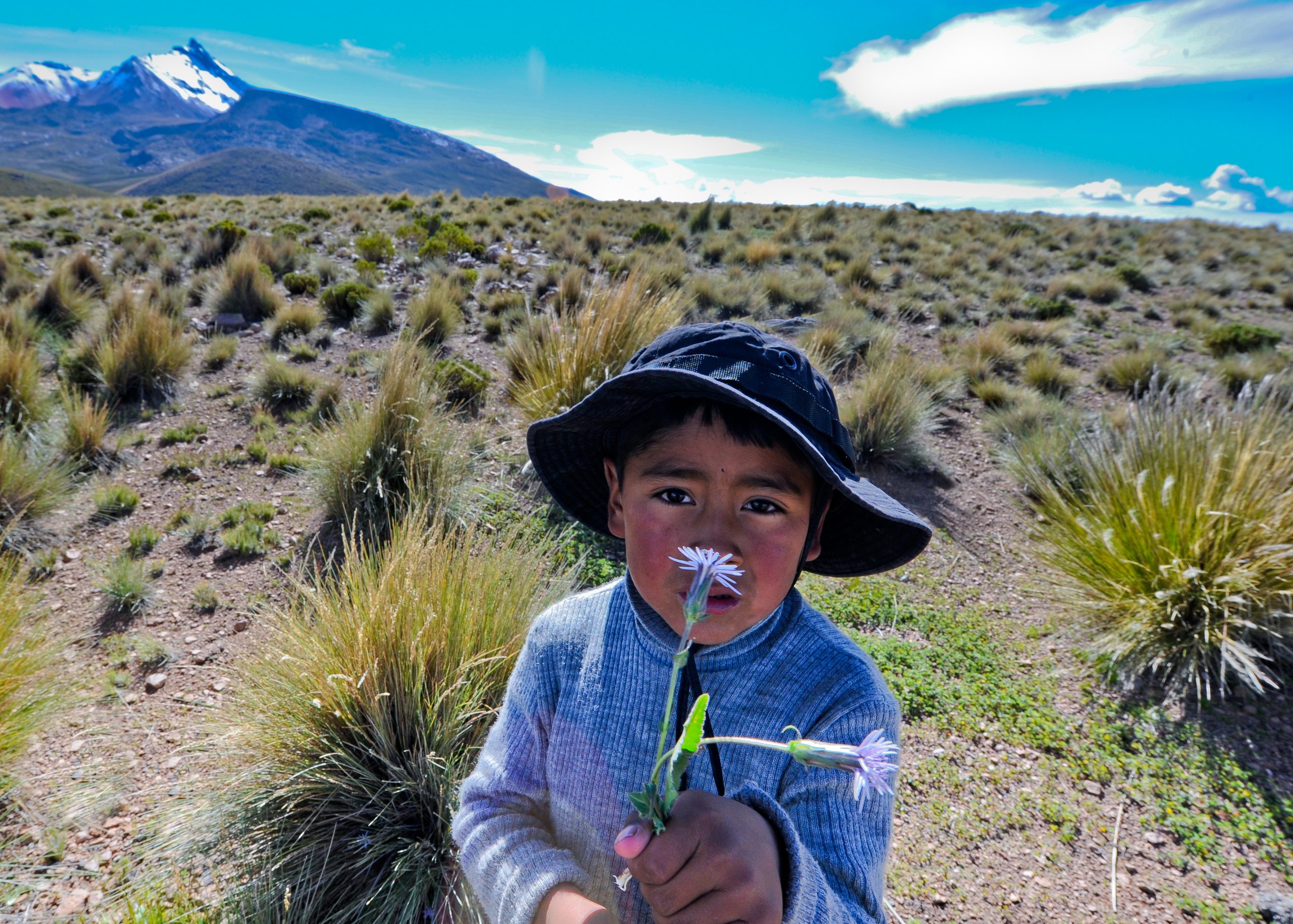

.jpg)
.jpg)
.jpg)
.jpg)


